Engage NY Eureka Math 5th Grade Module 5 Lesson 3 Answer Key
Eureka Math Grade 5 Module 5 Lesson 3 Sprint Answer Key
A
Multiply a Fraction and a Whole Number
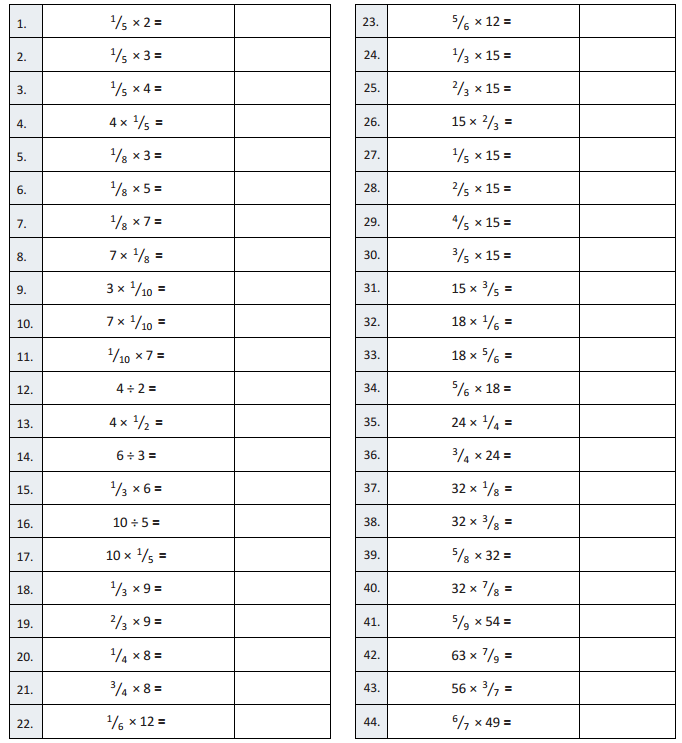
Question 1.
\(\frac{1}{5}\) × 2 =
Answer:
1/5 x 2 = 2/5
Question 2.
\(\frac{1}{5}\) × 3 =
Answer:
1/5 x 3 = 3/5
Question 3.
\(\frac{1}{5}\) × 4 =
Answer:
1/5 x 4 = 4/5
Question 4.
4 × \(\frac{1}{5}\) =
Answer:
4 x 1/5 = 4/5
Question 5.
\(\frac{1}{8}\) × 3 =
Answer:
3 x 1/8 = 3/8
Question 6.
\(\frac{1}{8}\) × 5 =
Answer:
1/8 x 5 = 5/8
Question 7.
\(\frac{1}{8}\) × 7 =
Answer:
1/8 x 7 = 7/8
Question 8.
7 × \(\frac{1}{8}\) =
Answer:
7 x 1/8 = 7/8
Question 9.
3 × \(\frac{1}{10}\) =
Answer:
3 x 1/10 = 3/10
Question 10.
7 × \(\frac{1}{10}\) =
Answer:
7 x 1/10 = 7/10
Question 11.
\(\frac{1}{10}\) × 7 =
Answer:
1/10 x 7 = 7/10
Question 12.
4 ÷ 2 =
Answer:
4/2 = 2
Question 13.
4 × \(\frac{1}{2}\) =
Answer:
4 x 1/2 = 4/2 or 2
Question 14.
6 ÷ 3 =
Answer:
6/3 = 2
Question 15.
\(\frac{1}{3}\) × 6 =
Answer:
1/3 x 6 = 6/3 or 2
Question 16.
10 ÷ 5 =
Answer:
10/5 = 2
Question 17.
10 × \(\frac{1}{5}\) =
Answer:
10 x 1/5 = 10/5 or 2
Question 18.
\(\frac{1}{3}\) × 9 =
Answer:
1/3 x 9 = 9/3 or 3
Question 19.
\(\frac{2}{3}\) × 9 =
Answer:
2/3 x 9 = 18/3 or 6
Question 20.
\(\frac{1}{4}\) × 8 =
Answer:
1/4 x 8 = 8/4 or 2
Question 21.
\(\frac{3}{4}\) × 8 =
Answer:
3/4 x 8 = 24/4 or 6
Question 22.
\(\frac{1}{6}\) × 12 =
Answer:
1/6 x 12 = 12/6 or 2
Question 23.
\(\frac{5}{6}\) × 12 =
Answer:
5/6 x 12 = 60/6 or 10
Question 24.
\(\frac{1}{3}\) × 15 =
Answer:
1/3 x 15 = 15/3 or 5
Question 25.
\(\frac{2}{3}\) × 15 =
Answer:
2/3 x 15 = 30/3 or 10
Question 26.
15 × \(\frac{2}{3}\) =
Answer:
15 x 2/3 = 30/3 or 10
Question 27.
\(\frac{1}{5}\) × 15 =
Answer:
1/5 x 15 = 15/ 5 = 3
Question 28.
\(\frac{2}{5}\) × 15 =
Answer:
2/5 x 15 = 30/5 or 6
Question 29.
\(\frac{4}{5}\) × 15 =
Answer:
4/5 x 15 = 60/5 or 12
Question 30.
\(\frac{3}{5}\) × 15 =
Answer:
3/5 x 15 = 45/5 or 9
Question 31.
15 × \(\frac{3}{5}\) =
Answer:
15 x 3/5 = 45/5 or 9
Question 32.
18 × \(\frac{1}{6}\) =
Answer:
18 x 1/6 = 18/6 or 3
Question 33.
18 × \(\frac{5}{6}\) =
Answer:
18 x 5/6 = 90/6 or 15
Question 34.
\(\frac{5}{6}\) × 18 =
Answer:
5/6 x 18 = 90/6 or 15
Question 35.
24 × \(\frac{1}{4}\) =
Answer:
24 x 1/4 = 24/4 or 6
Question 36.
\(\frac{3}{4}\) × 24 =
Answer:
3/4 x 24 = 72/ 4 or 18
Question 37.
32 × 1\(\frac{1}{8}\) =
Answer:
32 x 1/8 = 32/8 or 4
Question 38.
32 × \(\frac{3}{8}\) =
Answer:
32 x 3/8 = 96 or 12
Question 39.
\(\frac{5}{8}\) × 32 =
Answer:
5/8 x 32 = 160/8 = 20
Question 40.
32 × \(\frac{7}{8}\) =
Answer:
32 x 7/8 = 224/8 or 28
Question 41.
\(\frac{5}{9}\) × 54 =
Answer:
5/9 x 54 = 270/9 or30
Question 42.
63 × \(\frac{7}{9}\) =
Answer:
63 x 7/9 = 441/9 or 49
Question 43.
56 × \(\frac{3}{7}\) =
Answer:
56 x 3/7 = 168/7 or 24
Question 44.
\(\frac{6}{7}\) × 49 =
Answer:
6/7 x 49 = 294/7 = 42
B
Multiply a Fraction and a Whole Number
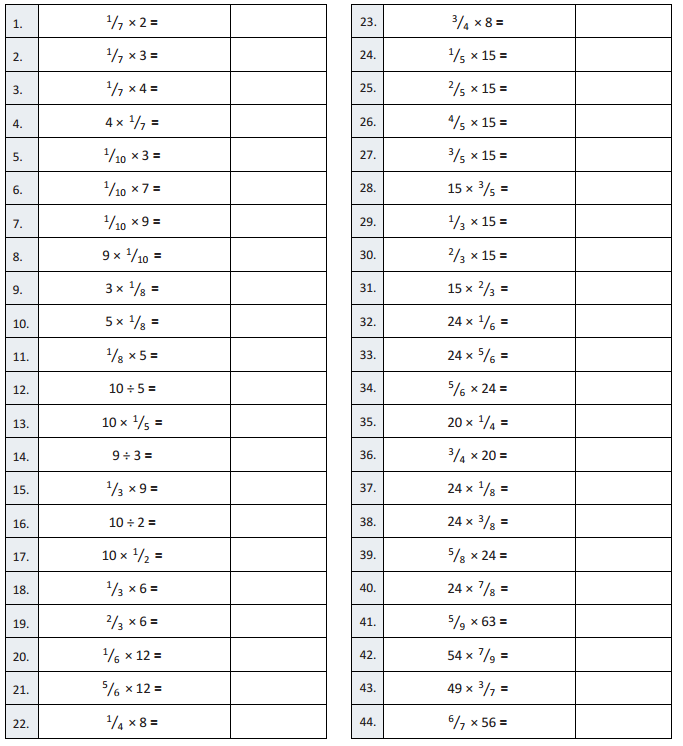
Question 1.
\(\frac{1}{7}\) × 2 =
Answer:
1/7 x 2 = 2/7
Question 2.
\(\frac{1}{7}\) × 3 =
Answer:
1/7 x 3 = 3/7
Question 3.
\(\frac{1}{7}\) × 4 =
Answer:
1/7 x 4 = 4/7
Question 4.
4 × \(\frac{1}{7}\) =
Answer:
4 x 1/7 = 4/7
Question 5.
\(\frac{1}{10}\) × 3 =
Answer:
1/10 x 3 = 3/10
Question 6.
\(\frac{1}{10}\) × 7 =
Answer:
1/10 x 7 = 7/10
Question 7.
\(\frac{1}{10}\) × 9 =
Answer:
1/10 x 9 = 9/10
Question 8.
9 × \(\frac{1}{10}\) =
Answer:
9 x 1/10 = 9/10
Question 9.
3 × \(\frac{1}{8}\) =
Answer:
3 x 1/8 = 3/8
Question 10.
5 × \(\frac{1}{8}\) =
Answer:
5 x 1/8 = 5/8
Question 11.
\(\frac{1}{8}\) × 5 =
Answer:
1/8 x 5 = 5/8
Question 12.
10 ÷ 5 =
Answer:
10/5 = 2
Question 13.
10 × \(\frac{1}{5}\) =
Answer:
10 x 1/5 = 10/5 = 2
Question 14.
9 ÷ 3 =
Answer:
9/3 = 3
Question 15.
\(\frac{1}{3}\) × 9 =
Answer:
1/3 x 9 = 9/3 or 3
Question 16.
10 ÷ 2 =
Answer:
10/2 = 5
Question 17.
10 × \(\frac{1}{2}\) =
Answer:
10 x 1/2 = 10/2 or 5
Question 18.
\(\frac{1}{3}\) × 6 =
Answer:
1/3 x 6 = 6/3 or 2
Question 19.
\(\frac{2}{3}\) × 6 =
Answer:
2/3 x 6 = 12/3 or 6
Question 20.
\(\frac{1}{6}\) × 12 =
Answer:
1/6 x 12 = 12/6 or 2
Question 21.
\(\frac{5}{6}\) × 12 =
Answer:
5/6 x 12 = 60/6 or 10
Question 22.
\(\frac{1}{4}\) × 8 =
Answer:
1/4 x 8 = 8/4 or 2
Question 23.
\(\frac{3}{4}\) × 8 =
Answer:
3/4 x 8 = 24/4 = 6
Question 24.
\(\frac{1}{5}\) × 15 =
Answer:
1/5 x 15 = 15/5 or 3
Question 25.
\(\frac{2}{5}\) × 15 =
Answer:
2/5 x 15 = 30/5 or 6
Question 26.
\(\frac{4}{5}\) × 15 =
Answer:
4/5 x 15 = 60/5 or 12
Question 27.
\(\frac{3}{5}\) × 15 =
Answer:
3/5 x 15 = 45/5 or 9
Question 28.
15 × \(\frac{3}{5}\) =
Answer:
15 x 3/5 = 45/5 or 9
Question 29.
\(\frac{1}{3}\) × 15 =
Answer:
1/3 x 15 =15/3 or 5
Question 30.
\(\frac{2}{3}\) × 15 =
Answer:
2/3 x 15 = 30/3 or 10
Question 31.
15 × \(\frac{2}{3}\) =
Answer:
15 x 2/3 = 30/3 or 10
Question 32.
24 × \(\frac{1}{6}\) =
Answer:
24 x 1/6 = 24/6 or 4
Question 33.
24 × \(\frac{5}{6}\) =
Answer:
24 x 5/6 = 120/6 or 20
Question 34.
\(\frac{5}{6}\) × 24 =
Answer:
5/6 x 24 = 120/6 or 20
Question 35.
20 × \(\frac{1}{4}\) =
Answer:
20 x 1/4 = 20/4 or 5
Question 36.
\(\frac{3}{4}\) × 20 =
Answer:
3/4 x 20 = 60/4 or 15
Question 37.
24 × 1\(\frac{1}{8}\) =
Answer:
24 x 1/8 = 24/8 or 3
Question 38.
24 × \(\frac{3}{8}\) =
Answer:
24 x 3/8 = 72/8 or 9
Question 39.
\(\frac{5}{8}\) × 24 =
Answer:
5/8 x 24 = 120/8 or 15
Question 40.
24 × \(\frac{7}{8}\) =
Answer:
24 x 7/8 = 168/8 or 21
Question 41.
\(\frac{5}{9}\) × 63 =
Answer:
5/9 x 63 = 315/9 or 35
Question 42.
54 × \(\frac{7}{9}\) =
Answer:
54 x 7/9 = 378/9 or 42
Question 43.
49 × \(\frac{3}{7}\) =
Answer:
49 x 3/7 = 147/7 or 21
Question 44.
\(\frac{6}{7}\) × 56 =
Answer:
6/7 x 56 = 48
Eureka Math Grade 5 Module 5 Lesson 3 Problem Set Answer Key
Question 1.
Use the prisms to find the volume.
Build the rectangular prism pictured below to the left with your cubes, if necessary.
Decompose it into layers in three different ways, and show your thinking on the blank prisms.
Complete the missing information in the table.
a.

|
Number of Layers |
Number of Cubes in Each Layer |
Volume of the Prism |
| cubic cm | ||
| cubic cm | ||
| cubic cm |
Answer :

b.
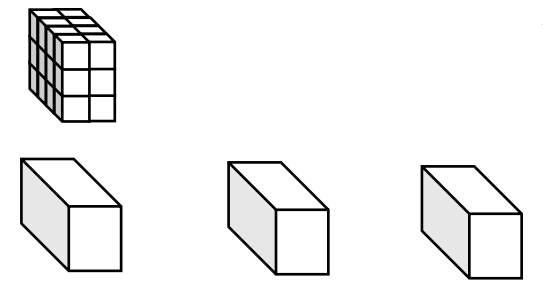
|
Number of Layers |
Number of Cubes in Each Layer |
Volume of the Prism |
| cubic cm | ||
| cubic cm | ||
| cubic cm |
Answer:

Question 2.
Josh and Jonah were finding the volume of the prism to the right. The boys agree that 4 layers can be added together to find the volume. Josh says that he can see on the end of the prism that each layer will have 16 cubes in it. Jonah says that each layer has 24 cubes in it. Who is right? Explain how you know using words, numbers, and/or pictures.
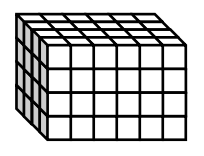
Answer:
Jonah is correct
Each layer of cube has 6 cubes in a row and 4 cube in column
So, 6 x 4 = 24 cubes in each layer
Total number of layers = 4
Now, 24 x 4 = 96
Josh sees only 16 cubes are there on the end layer.
He would have to multiply by 6 , not 4
According to Josh he got 16 x 4 = 64, not 96
So, Jonah is correct.
Question 3.
Marcos makes a prism 1 inch by 5 inches by 5 inches. He then decides to create layers equal to his first one. Fill in the chart below, and explain how you know the volume of each new prism.
|
Number of Layers |
Volume |
Explanation |
| 2 | ||
| 4 | ||
| 7 |
Answer:

Question 4.
Imagine the rectangular prism below is 6 meters long, 4 meters tall, and 2 meters wide. Draw horizontal lines to show how the prism could be decomposed into layers that are 1 meter in height.
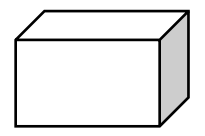
It has _____ layers from bottom to top.
Each horizontal layer contains ______ cubic meters.
The volume of this prism is __________.
Answer:

It has 4 layers from bottom to top.
Each horizontal layer contains 12 cubic meters.
The volume of this prism is 48 cubic meters
Eureka Math Grade 5 Module 5 Lesson 3 Exit Ticket Answer Key
Question 1.
Use unit cubes to build the figure to the right, and fill in the missing information.

Number of layers: _______
Number of cubes in each layer: ______
Volume: ______ cubic centimeters
Answer:
Number of layers: 2
Number of cubes in each layer: 6
Volume: 12 cubic centimeters
Question 2.
This prism measures 3 units by 4 units by 2 units. Draw the layers as indicated.
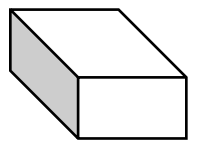
Number of layers: 4
Number of cubic units in each layer: 6
Volume: ______ cubic centimeters
Answer:
Number of cubic units in each layer: 6
Volume: 24 cubic centimeters
Eureka Math Grade 5 Module 5 Lesson 3 Homework Answer Key
Question 1.
Use the prisms to find the volume.
- The rectangular prisms pictured below were constructed with 1 cm cubes.
- Decompose each prism into layers in three different ways, and show your thinking on the blank prisms.
- Complete each table.
a.
|
Number of Layers |
Number of Cubes in Each Layer |
Volume of the Prism |
| cubic cm | ||
| cubic cm | ||
| cubic cm |
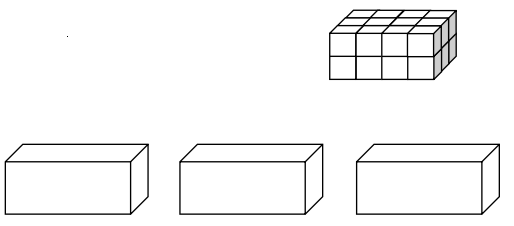
Answer :


b.
|
Number of Layers |
Number of Cubes in Each Layer |
Volume of the Prism |
| cubic cm | ||
| cubic cm | ||
| cubic cm |
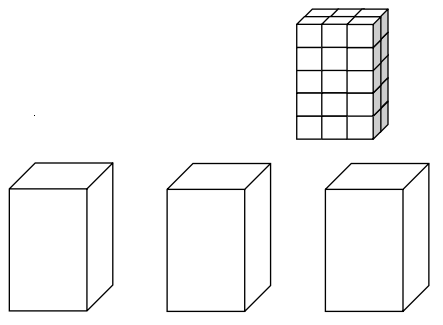
Answer:


Question 2.
Stephen and Chelsea want to increase the volume of this prism by 72 cubic centimeters. Chelsea wants to add eight layers, and Stephen says they only need to add four layers. Their teacher tells them they are both correct. Explain how this is possible.
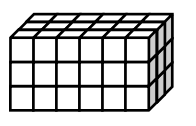
Answer:
Yes, both Stephen and Chelsea are correct because,
Stephen thought to add eight layers which means, 8 x 9 = 72
Chelsea said that they need only 4 layers
Which means. 4 x 18 = 72
Therefore, both are correct.
Question 3.
Juliana makes a prism 4 inches across and 4 inches wide but only 1 inch tall. She then decides to create layers equal to her first one. Fill in the chart below, and explain how you know the volume of each new prism.
|
Number of Layers |
Volume |
Explanation |
| 3 | ||
| 5 | ||
| 7 |
Answer:

Question 4.
Imagine the rectangular prism below is 4 meters long, 3 meters tall, and 2 meters wide. Draw horizontal lines to show how the prism could be decomposed into layers that are 1 meter in height.
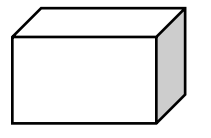
It has _____ layers from top to bottom.
Each horizontal layer contains ______ cubic meters.
The volume of this prism is __________
Answer:

It has 3 layers from top to bottom.
Each horizontal layer contains 8 cubic meters.
The volume of this prism is 24 cubic metres